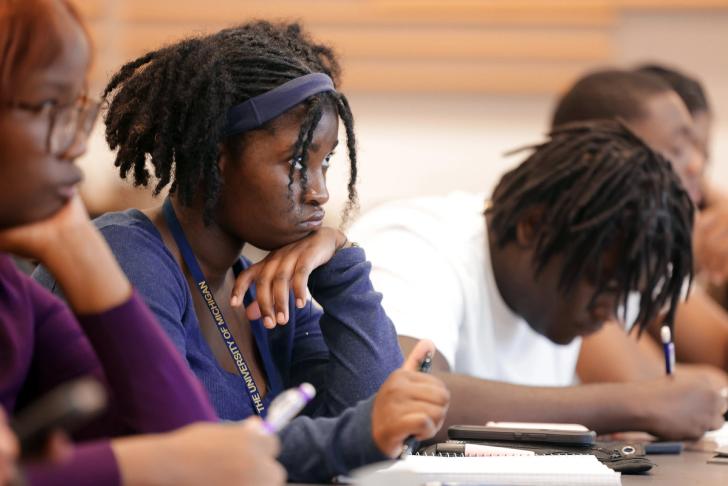Click here to read the original Action Item
Progress to Date
Over the past academic year, a steering committee of four students and four university leaders organized a framework for implementing the 4 Point Platform. This initial year of the plan focused on reinforcing successful programs and cultivating new avenues that are broadly applicable for community engagement to promote equitable access, achievement and belonging among Black students, in particular. Additionally, as a part of working to address anti-Blackness, the Steering Committee, along with workgroup facilitators, engaged together in a specific iteration of the CRLT virtual session "How Do We Begin: A Historical Reckoning with Anti-Black Racism at U-M." Some initiatives from this year include:
- In conjunction with Black Welcome Week, the August 2023 Harambee convocation aimed at building community and bolstering a sense of belonging among new and returning students. In all, 135 students, staff, faculty and administrators participated in what will now be an annual event.
- Launched at an event sponsored by the Black Alumni Association, Black Student Union and the Office of DEI, the newly established Council of Elders has proved to be an effective avenue for nurturing intergenerational dialogue.
- In all, more than 600 students, staff, faculty and others attended three Soul Food Sundays celebrated during February to encourage culinary traditions and provide venues for celebration and interaction.
Thanks to diversity-focused outreach efforts, the 2023-24 academic year saw an increase of 16 percent in the enrollment of new students of color, and a 25 percent increase in the Black or African American student population.
Other outreach efforts included:
- College application workshops at underrepresented high schools statewide
- Virtual community-building programs for prospective, admitted, and enrolling students
- Stipends that enabled prospective students from low-income and underrepresented high schools to visit campus
- Expanded collaboration with Latinx and African American alums, among others, and undergrads in recruitment events
In the fall of 2024, a 20-person Implementation Council composed of students, staff, faculty and a part-time project manager will be launched to implement plans, carry out strategies and create long-term support mechanisms.
Responsible Unit(s): The Office of Diversity, Equity & Inclusion, the Division of Student Life and the Office of Enrollment Management
